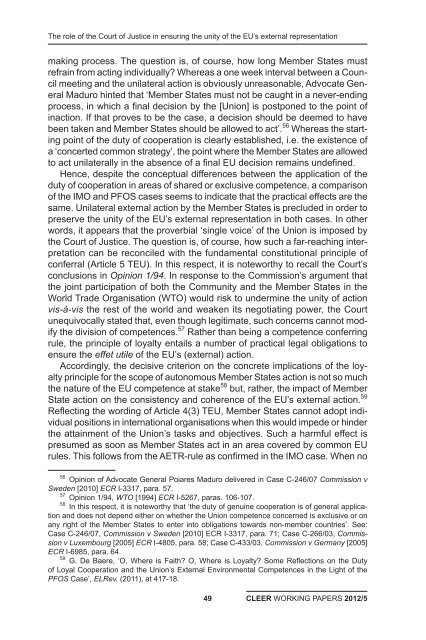Principles and practices of EU external representation - TMC Asser ...
Principles and practices of EU external representation - TMC Asser ...
Principles and practices of EU external representation - TMC Asser ...
You also want an ePaper? Increase the reach of your titles
YUMPU automatically turns print PDFs into web optimized ePapers that Google loves.
The role <strong>of</strong> the Court <strong>of</strong> Justice in ensuring the unity <strong>of</strong> the <strong>EU</strong>’s <strong>external</strong> <strong>representation</strong><br />
making process. The question is, <strong>of</strong> course, how long Member States must<br />
refrain from acting individually? Whereas a one week interval between a Council<br />
meeting <strong>and</strong> the unilateral action is obviously unreasonable, Advocate General<br />
Maduro hinted that ‘Member States must not be caught in a never-ending<br />
process, in which a final decision by the [Union] is postponed to the point <strong>of</strong><br />
inaction. If that proves to be the case, a decision should be deemed to have<br />
been taken <strong>and</strong> Member States should be allowed to act’. 56 Whereas the starting<br />
point <strong>of</strong> the duty <strong>of</strong> cooperation is clearly established, i.e. the existence <strong>of</strong><br />
a ‘concerted common strategy’, the point where the Member States are allowed<br />
to act unilaterally in the absence <strong>of</strong> a final <strong>EU</strong> decision remains undefined.<br />
Hence, despite the conceptual differences between the application <strong>of</strong> the<br />
duty <strong>of</strong> cooperation in areas <strong>of</strong> shared or exclusive competence, a comparison<br />
<strong>of</strong> the IMO <strong>and</strong> PFOS cases seems to indicate that the practical effects are the<br />
same. Unilateral <strong>external</strong> action by the Member States is precluded in order to<br />
preserve the unity <strong>of</strong> the <strong>EU</strong>’s <strong>external</strong> <strong>representation</strong> in both cases. In other<br />
words, it appears that the proverbial ‘single voice’ <strong>of</strong> the Union is imposed by<br />
the Court <strong>of</strong> Justice. The question is, <strong>of</strong> course, how such a far-reaching interpretation<br />
can be reconciled with the fundamental constitutional principle <strong>of</strong><br />
conferral (Article 5 T<strong>EU</strong>). In this respect, it is noteworthy to recall the Court’s<br />
conclusions in Opinion 1/94. In response to the Commission’s argument that<br />
the joint participation <strong>of</strong> both the Community <strong>and</strong> the Member States in the<br />
World Trade Organisation (WTO) would risk to undermine the unity <strong>of</strong> action<br />
vis-à-vis the rest <strong>of</strong> the world <strong>and</strong> weaken its negotiating power, the Court<br />
unequivocally stated that, even though legitimate, such concerns cannot modify<br />
the division <strong>of</strong> competences. 57 Rather than being a competence conferring<br />
rule, the principle <strong>of</strong> loyalty entails a number <strong>of</strong> practical legal obligations to<br />
ensure the effet utile <strong>of</strong> the <strong>EU</strong>’s (<strong>external</strong>) action.<br />
Accordingly, the decisive criterion on the concrete implications <strong>of</strong> the loyalty<br />
principle for the scope <strong>of</strong> autonomous Member States action is not so much<br />
the nature <strong>of</strong> the <strong>EU</strong> competence at stake 58 but, rather, the impact <strong>of</strong> Member<br />
State action on the consistency <strong>and</strong> coherence <strong>of</strong> the <strong>EU</strong>’s <strong>external</strong> action. 59<br />
Reflecting the wording <strong>of</strong> Article 4(3) T<strong>EU</strong>, Member States cannot adopt individual<br />
positions in international organisations when this would impede or hinder<br />
the attainment <strong>of</strong> the Union’s tasks <strong>and</strong> objectives. Such a harmful effect is<br />
presumed as soon as Member States act in an area covered by common <strong>EU</strong><br />
rules. This follows from the AETR-rule as confirmed in the IMO case. When no<br />
56 Opinion <strong>of</strong> Advocate General Poiares Maduro delivered in Case C-246/07 Commission v<br />
Sweden [2010] ECR I-3317, para. 57.<br />
57 Opinion 1/94, WTO [1994] ECR I-5267, paras. 106-107.<br />
58 In this respect, it is noteworthy that ‘the duty <strong>of</strong> genuine cooperation is <strong>of</strong> general application<br />
<strong>and</strong> does not depend either on whether the Union competence concerned is exclusive or on<br />
any right <strong>of</strong> the Member States to enter into obligations towards non-member countries’. See:<br />
Case C-246/07, Commission v Sweden [2010] ECR I-3317, para. 71; Case C-266/03, Commission<br />
v Luxembourg [2005] ECR I-4805, para. 58; Case C-433/03, Commission v Germany [2005]<br />
ECR I-6985, para. 64.<br />
59 G. De Baere, ‘O, Where is Faith? O, Where is Loyalty? Some Reflections on the Duty<br />
<strong>of</strong> Loyal Cooperation <strong>and</strong> the Union’s External Environmental Competences in the Light <strong>of</strong> the<br />
PFOS Case’, ELRev. (2011), at 417-18.<br />
49<br />
CLEER WORKING PAPERS 2012/5

















